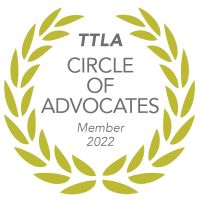Last year, the Tennessee legislature passed a bill making it illegal to hold a cellphone while operating a vehicle. This legislation is in response to mountains of data showing that driving distracted is the cause of most car crashes. In fact, statistics show that more teenagers are killed or injured by distracted driving than drunk driving. Distracted driving is a huge problem, and with the amount of information that we are able to access through our phones, the problem is not likely to go away soon.
The law provides that no one may operate a motor vehicle on any road or highway in Tennessee while holding (or supporting with any part of the body) a cell phone. The law provides that drivers over the age of 18 may use a cell phone to communicate through headphones or a vehicles’ speaker system (Bluetooth), but the driver may only touch the phone itself (1 button) to initiate or terminate the call.
Text messaging is, not surprisingly, prohibited as well. That means drivers are prohibited from, not only writing a text, but also reading a text from a phone. Drivers may not read texts, emails, internet information, or instant messages. However, a driver over the age of 18 may use their device to automatically convert a voice communication into a written message (voice command). Drivers may also use their phones (without holding them) to provide navigation assistance through a car’s Bluetooth or a cell phone speaker phone.
Watching videos or movies, recording videos (like You-Tube videos) are also prohibited. Reaching for a cell phone in the vehicle is prohibited if it requires you to move out of a driving position (like leaning back to reach in the backseat for a cell phone in a pocket book).
The law allows for a cell phone to be mounted on the dash, cup-holder/center console, or windshield and physically touched by a driver if limited to a swipe or tap, so long as the phone is not used for camera or video, gaming, internet, etc. Again, we can use our phones for navigation, but physically touching the phone must be very limited.
Violation of the law is a class C misdemeanor, and carries a $50.00 fine for first offenders. Those fees go up if an offender repeats. $200.00 fees are levied for violations of the law in a school zone (while flashing) or work zone when workers are present.
With all the data out there showing the relationship between distracted driving and auto crashes, we expect that cellular service providers will begin maintaining user data for a longer period of time, making it easy to obtain cell phone use information following a crash. Experts are already able to analyze a physical cell phone for these purposes if the cell phone is still available after a case is filed.
Lawyers will be looking for any citations given in violation of the law as part of any car wreck investigation. Our lawyers will no doubt try to use any driver’s use of a cell phone in violation of the law as evidence of negligent or reckless conduct in the event of a crash with injuries. You may wish to turn your phone’s “Do not Disturb” function on, which eliminates receipt of texts while your phone is connected to your vehicle by Bluetooth. The takeaway is this: We all need to avoid using our phones in a way that distracts us from the job of safe driving. It’s against the law and can result in catastrophic injuries to ourselves and others. You are too important to us and the ones that love you to ignore these laws! Be safe out there!






